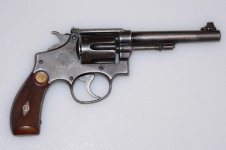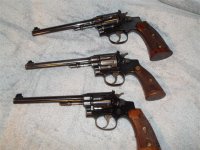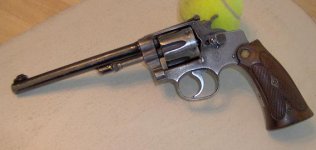There are a lot of disconnected posts about these, so I thought maybe there could be a spot where images of various versions of this model (from the earliest 1911 production run to the post-1935 ones with the recessed cylinder) could be perused.
I'll start it off with #5175xx, shipped in 1930. The hammer spur is truncated, but I can't say whether it was broken off and the fracture then smoothed out, or if it was deliberately shortened for some reason.
I'll start it off with #5175xx, shipped in 1930. The hammer spur is truncated, but I can't say whether it was broken off and the fracture then smoothed out, or if it was deliberately shortened for some reason.
Attachments
Last edited:














